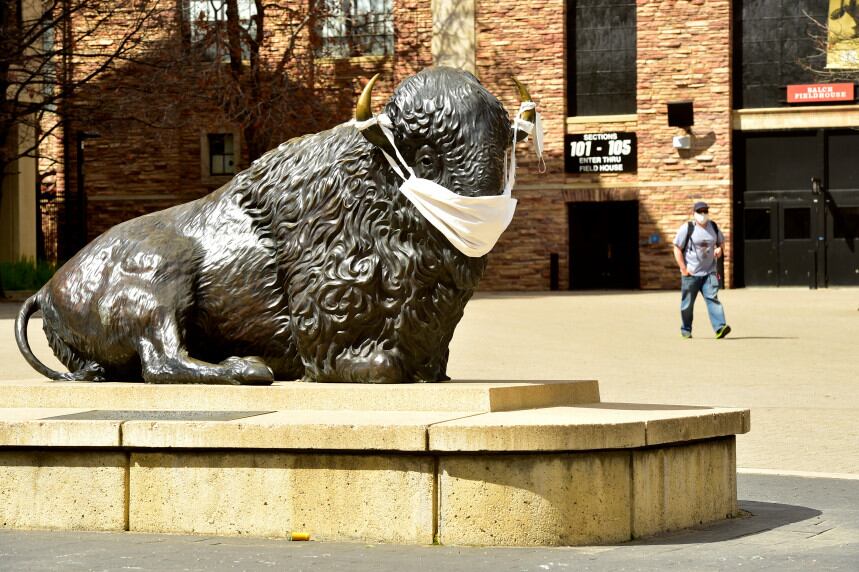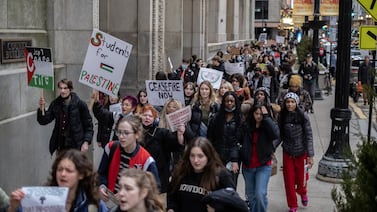With great anticipation and optimism, three major universities reopened their campuses this month to students. But within two weeks, the coronavirus spread among the student body, and all three reversed course and reverted to remote learning.
Will the experiences of the University of North Carolina at Chapel Hill, Michigan State University, and Notre Dame offer lessons to Colorado colleges planning in-person classes? Or will the state’s schools encounter the same pitfalls?
Colorado colleges and universities tout plans to avoid a similar fate, but some wonder if the precautions are enough to prevent outbreaks of COVID-19 that would end up closing campuses again. The state has no clear thresholds for what would trigger such a step.
The University of Colorado Boulder this week required arriving students to take a COVID-19 test five days before moving into dorms. The school reported nine cases. Those students must isolate until the school’s medical service clears them, according to Melanie Parra, a CU Boulder spokeswoman.
But officials realize that their decision to bring students together hinges on one unpredictable factor: the behavior of post-adolescent youth thrilled to meet new friends and shed the restrictions of home.
University administrators are stressing personal responsibility and student education. They’ve also issued calls to action.
Joyce McConnell, Colorado State University president, issued a statement lauding students for being responsible, caring, and empathetic. But she warned, “to those of you who are not compliant with state, county and university health protocols: You may be the reason someone loses their life. It is that serious.”
But even if 90% of students comply, the virus can play havoc even with a few non-compliers.
At Colorado College, a student tested positive several days after move-in, prompting the quarantine of more than 100 students. The college said the student didn’t follow rules about staying isolated until they received test results.
At UNC Chapel Hill, 135 COVID cases cropped up among students in residence halls, apartments, and at a fraternity, all in the first week of the campus reopening this month. The university announced a move to remote classes for the rest of the semester and sent students home from dorms.
Michigan State is also closing for in-person learning this semester after leaders there admitted they could not keep the virus from spreading.
Colorado’s colleges and universities are following health guidelines, including limiting dorm capacity, requiring students to wear masks, stressing social distancing, and installing plexiglass barriers in classes to separate students and instructors. They are also asking students to check whether they are experiencing COVID-19 symptoms daily.
Schools are creating ways for students in dorms to get to-go meals. Schools such as Colorado State University have installed disinfecting stations. Campuses also have dorm space set aside to quarantine students living in on-campus housing. Schools such as CSU also are offering free COVID-19 tests on campus.
Institutions are taking various measures to reach out to students. The University of Northern Colorado, for example, is using online video training. Adams State is requiring an online safety course. The University of Colorado Boulder changed its student code of conduct.
But many worry that the social nature of college communities will make it difficult to contain the virus if students don’t follow precautions off campus.
School leaders are closely watching the number of cases among students, but there is no definition for what would trigger a move to remote instruction. Officials at Adams State University, Colorado State University, the University of Northern Colorado, and Regis University said they will consult with public health officials before deciding whether to end on-campus learning.
Gov. Jared Polis said on Friday he is concerned about college parties where social distancing isn’t likely to be enforced. He made his remarks to reporters after extending the last call to buy alcohol at bars and restaurants by one hour, to 11 p.m. He said he is less worried about students who head to restaurants and bars to drink.
Isaiah Chavous, one of CU Boulder’s three student body presidents, said the success of the return will ultimately be decided by students and whether they hold each other accountable.
“(Safety measures) on campus will be relatively easy to maintain,” Chavous said. “Where it gets tricky is when students are off campus.”
Chavous said he hopes students will keep themselves safe and, in turn, keep others safe — on and off campus.







